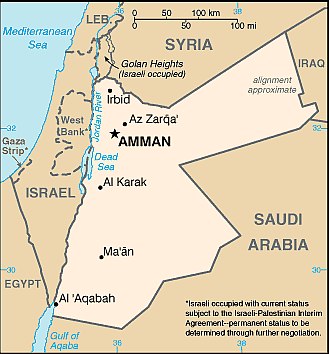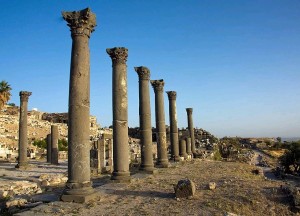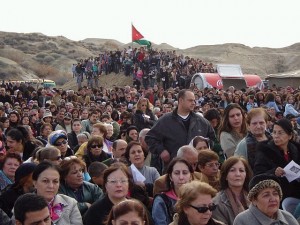The Hashemite Kingdom of Jordan

• Full name: The Hashemite Kingdom of Jordan
• Population: 6.1 million (UN, 2008)
• Capital: Amman
• Area: 89,342 sq km (34,492 sq miles)
• Major language: Arabic
• Major religion: Islam
• Life expectancy: 71 years (men), 74 years (women) (UN)
• Monetary unit: 1 Jordan dinar = 1,000 fils
• Main exports: Phosphates, fertilisers, agricultural products
• GNI per capita: US $2,850 (World Bank, 2007)
• Internet domain: .jo
• International dialling code: +962
• Education Budget:
• Health care Budget:
• Hospitals:
• Beds:
• Medical Devices/furniture imports:
 Jordan is an Arab country with challenging supplies of water, oil, and other natural resources but well developed human resources. King Abdallah II, since assuming the throne in 1999, has undertaken some broad economic reforms in a long-term effort to improve living standards. Since Jordan’s graduation from its most recent IMF program in 2002, Amman has continued to follow IMF guidelines, practicing careful monetary policy, making substantial headway with privatization, and opening the trade regime. Jordan’s exports have significantly increased under the free trade accord with the US and Jordanian Qualifying Industrial Zones (QIZ), which allow Jordan to export goods with some Israeli content duty free to the US.
Jordan is an Arab country with challenging supplies of water, oil, and other natural resources but well developed human resources. King Abdallah II, since assuming the throne in 1999, has undertaken some broad economic reforms in a long-term effort to improve living standards. Since Jordan’s graduation from its most recent IMF program in 2002, Amman has continued to follow IMF guidelines, practicing careful monetary policy, making substantial headway with privatization, and opening the trade regime. Jordan’s exports have significantly increased under the free trade accord with the US and Jordanian Qualifying Industrial Zones (QIZ), which allow Jordan to export goods with some Israeli content duty free to the US.
In 2006 and 2008, Jordan used privatization proceeds to significantly reduce its debt-to-GDP ratio. These measures have helped improve productivity and have made Jordan more attractive for foreign investment. The government ended subsidies for petroleum and other consumer goods in 2008 in an effort to control the budget. The main challenges facing Jordan are reducing dependence on foreign grants, reducing the growing budget deficit, attracting investments, and creating jobs.
Jordan is currently exploring nuclear power generation to forestall energy shortfalls. Jordan’s conservative banking sector has been largely protected from the worldwide financial crisis, but many businesses, particularly in the tourism and real estate sector, are predicting a slow-down in 2009.
 GDP (purchasing power parity): $31.61 billion (2008 est.)
GDP (purchasing power parity): $31.61 billion (2008 est.)
country comparison to the world: 103 $29.93 billion (2007 est.)
GDP (official exchange rate): $20.03 billion (2008 est.)
GDP – real growth rate: 5.6% (2008 est.)
country comparison to the world: 68
GDP – per capita (PPP): $5,100 (2008 est.)
country comparison to the world: 139
Budget:
revenues: $5.67 billion
expenditures: $7.66 billion (2008 est.)